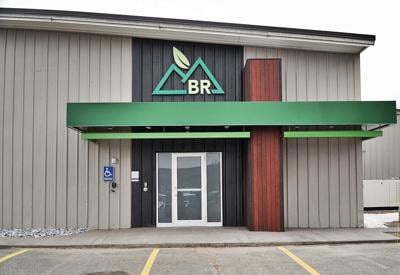As the state cannabis board preps to award licenses, fueling an emerging industry, a leading bank is hitting the brakes.
This week, Citizens Bank told an unspecified number of customers with connections to the cannabis trade that their accounts will be closed, offering no written explanation.
The fine print on the letter that one customer received delivered an extra jolt.
In the third paragraph, Peter C. Bernard learned that his Citizens Bank account would be terminated as of April 20, a date celebrated across the cannabis world as 420.
"I think it was a kick in the face on the way out the door," said Bernard, executive director of the Massachusetts Grower Advocacy Council, which lobbies for pro-cannabis policies. Separately, he is owner of the Harvest Cup, a cannabis trade show.
Both entities received form letters from Citizens Bank.
It is not the first time the federal government's stance against cannabis has tripped up business activity in Massachusetts.
In January, a state-sanctioned medical marijuana dispensary in Great Barrington had to briefly stop accepting debit cards for payment, until it found a new provider.
This week, that company, Theory Wellness, continues to do business as before, said Nick Friedman, its president and chief financial officer.
"We haven't had any issues," Friedman said.
And Berkshire Roots in Pittsfield, which opened nearly two weeks ago as the county's second medical marijuana dispensary, continues to accept debit cards and has not been affected by banking issues, a spokeswoman said.
But this week's clampdown by Citizens Bank is a reminder that even as hundreds of license applications pour in to the Cannabis Control Commission in Boston, obtaining one essential business support service — banking — remains a challenge.
State Sen. Patricia D. Jehlen, D-Somerville, has been watching the banking dilemma faced by those wishing to engage with a newly legal business.
"Apparently the credit card companies pulled out when Mr. (Jeff) Sessions made his remarks," Jehlen said. She was referring to the U.S. attorney general's move in January to revoke an Obama-era memo instructing federal officials not to interfere with state-sanctioned cannabis businesses.
"How are people going to cope?" Jehlen asked. "I have no idea. Are they going to put cash in their mattresses?"
Steering clear
Megan Griffin, a vice president for media relations with Citizens Bank, said she could not speak about an individual customer's account. But she confirmed that the bank's policy is to steer clear of the cannabis industry.
"Use of marijuana is not currently recognized as legal by the federal government, and given this open jurisdictional issue, Citizens Bank does not do business with this industry segment," she said in response to questions from The Eagle.
In the letter the bank sent to Bernard, it did not point to any reason to jettison his two business accounts.
The letter provided a phone number in Rhode Island to call, but didn't offer hope of reconciliation.
"You are reminded," the letter read, "that pursuant to the terms of the Agreement, Citizens Bank is under no obligation to disclose to you its reasons for closing the Account(s)."
Bernard said he went to a Citizens Bank branch early Thursday to close one of the accounts, rather than wait for April 20. He asked for an explanation.
"They told us it is because they consider us cannabis-related businesses," he said.
Separately, Tara J. Hopper, a member of the Massachusetts Grower Advocacy Council's board, learned that she could no longer have payments from her employer transferred by direct deposit into her Citizens Bank account.
Hopper, a lawyer, serves as general counsel for Garden Remedies, a medical marijuana dispensary in Newton. Another official with the advocacy council had a personal account with Citizens closed as well, Bernard said.
"They shut us all down at the same time," he said.
Even before state voters backed full legalization in November 2016, companies involved with the emerging industry stumbled over Washington's stance on cannabis,. The drug is classified as dangerous under the Controlled Substances Act.
Marc Shepard, president and co-founder of the New England Cannabis Convention, a trade group, said he had to go bank-shopping in a hurry in 2015.
"We got bounced from a couple of banks," said Shepard, who just wrapped up his company's latest convention.
Before opening another account, he said, he insisted on speaking with a bank officer to be sure they wanted his business.
"It took half a day, and you're still crossing your fingers, and nervous," Shepard said.
Though his business has no actual transactions involving the Schedule 1 drug, it remains vulnerable — a situation facing all those hoping to jump in as Massachusetts readies for recreational sales in July.
"Technically, that's against the law," Shepard said of cannabis convention planning. "The law says you can't 'aid and abet.'"
Without access to everyday banking services, fledgling cannabis businesses could find themselves cut out of electronic banking systems relied upon by countless American businesses.
"This problem is on a federal level," Shepard said. "There are huge concerns, absolutely."
Bank hunt
Bernard, the executive director of the advocacy council, said Thursday he's off in search of a new bank after 15 months with Citizens, hoping "that one of them isn't going to be afraid of the word 'cannabis.'"
Shepard said he banks now with Rockland Trust. Century Bank, led by Barry R. Sloane, is used by many of the state's registered marijuana dispensaries.
Like Shepard, Bernard is worried about what lies ahead for cannabis entrepreneurs. None of their businesses even engages in cannabis production or sales.
"If I'm having a hard time, what about these guys opening up grow operations?" Bernard asked. "I'm just a little nonprofit, and if I'm having a hard time, what about the real industry?"
He added: "What's going to happen a year from now if we don't have this banking problem solved?"
Larry Parnass can be reached at lparnass@berkshireeagle.com, at @larryparnass on Twitter and 413-496-6214.


